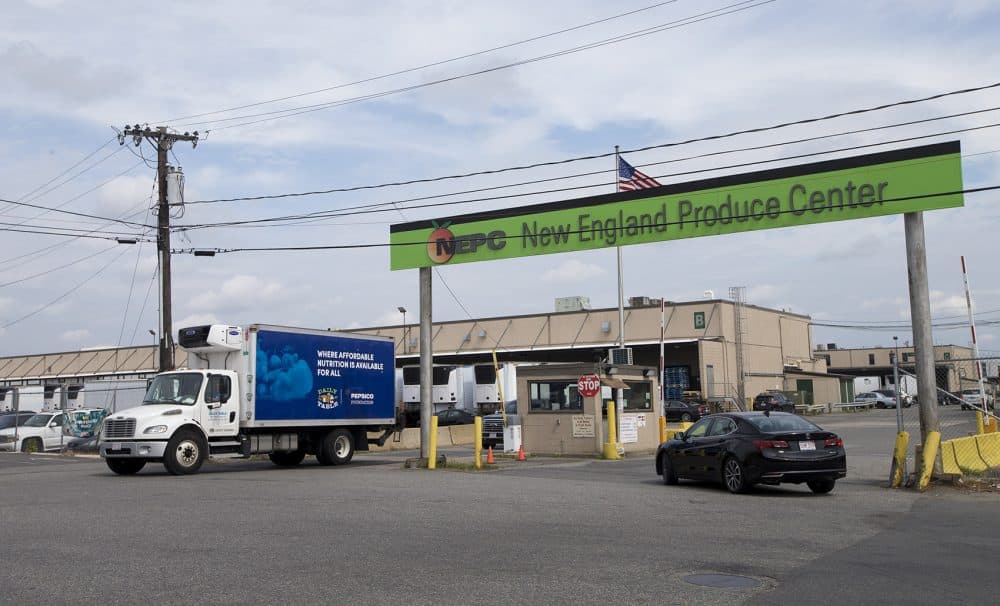Advertisement
CLIMATE CHANGE IN MASS.
How A Bad Storm Could Endanger New England's Food Supply
Resume
It’s a nightmare scenario for area urban planners. If a major storm like Hurricane Sandy were to hit Greater Boston, New England’s food supply could take a major hit.
That’s because the facility responsible for getting produce out to almost 8 million people across the region and parts of Canada sits in a flood zone in Chelsea, just less than a mile away from the Mystic River.
Marc Draisen, executive director of the Metropolitan Area Planning Council (MAPC), thinks about that scenario often.
“[A major storm] would make it virtually impossible to navigate along Beacham Street, which is the main road here," Draisen says. "The train tracks would be covered that bring produce into this area, and the New England Produce Center wouldn’t really be operable if we had that serious of a storm surge."
The New England Produce Center (NEPC) is made up of four buildings that total almost 3,000 feet in length, making it the third-largest food distribution center in the country.
Before dawn, trucks carrying fruits and vegetables start making their way into NEPC's giant parking lot to pick up deliveries for grocery stores and other vendors. It’s a scene that Chelsea City Manager Tom Ambrosino -- who himself used to work at the center unloading produce from incoming trains -- looks at with a lot of pride, and some degree of worry.
"This is a major job provider to the area, so if it were inundated with water, there would be thousands of people who are unemployed, at least temporarily, if not long term,” Ambrosino says.
Draisen also says it's important to consider the benefits of keeping the NEPC in mostly low-to-moderate-income Chelsea rather than moving it somewhere less vulnerable to flooding.
"This is an ideal area from a transportation perspective," Draisen adds. "You’re right near the center of the city, and you’re right near the interchanges."
"If this facility were to be shut down for any period of time, produce prices would skyrocket in the Northeast."
Chelsea City Manager Tom Ambrosino
Draisen’s team at MAPC and the city of Chelsea are currently exploring ways to build green infrastructure around the facility, as outlined in a report released earlier this year.
As it stands now, the building is made up of mostly heavy, impermeable concrete, which is unable to drain water. The city is planning to restore lost marshland around the area, which soaks up water like a sponge in the face of a storm surge.
Draisen admits it's not the magic answer to a storm with the magnitude of Sandy, but he says it's a relatively inexpensive way to mitigate the very real threat of a rising sea level.
“Even if we had a storm like Hurricane Sandy, it would make the flooding much less problematic and you can recover more quickly. If you can recover in two days instead of five, that’s a huge benefit,” Draisen says.
The project is estimated to cost around $12 million for both marsh restoration and roadwork, and would take anywhere from three to five years to fully implement. Both Ambrosino and Draisen say they’re confident they’ll be able to raise that money using a combination of city, state and federal funds.
They warn that if measures aren’t taken to protect the center, the financial recourse from a serious storm could be huge.
“If this facility were to be shut down for any period of time, produce prices would skyrocket in the Northeast,” Ambrosino says.
The NEPC and other surrounding food distribution centers have already been declared as among the priority areas by a group of 14 local city leaders, including Boston Mayor Marty Walsh. This dedicates more resources to studying how climate change will affect the area.
Chelsea officials hope to start working on the first phase of the project, marsh restoration, as early as 2018.
This segment aired on August 16, 2017.

